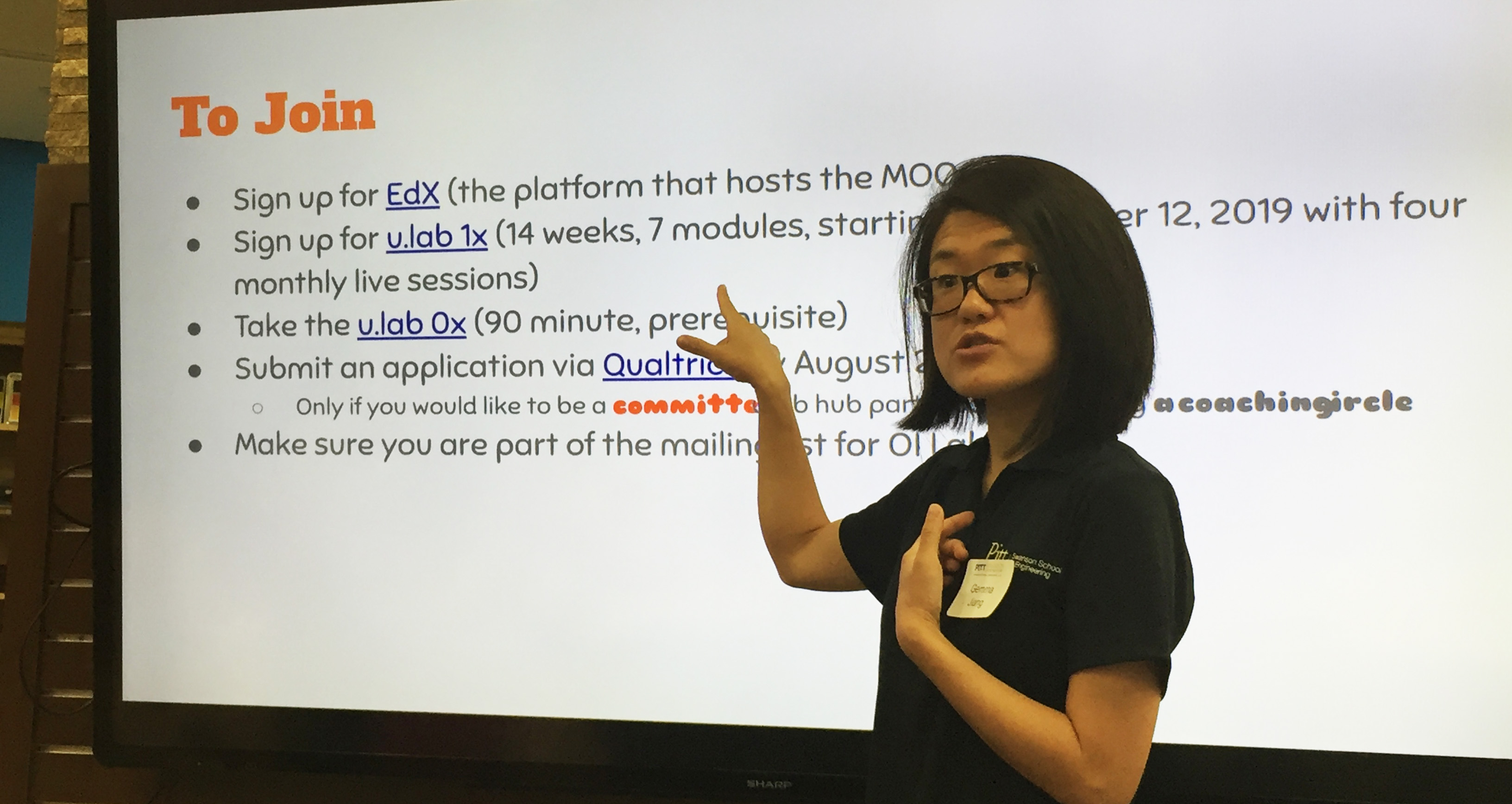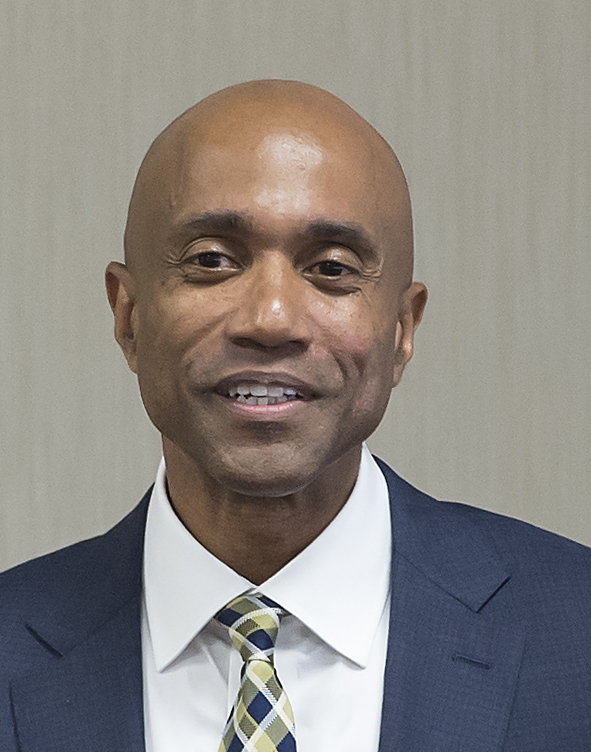
By SUSAN JONES
Dean Jimmy Martin of the Swanson School of Engineering and Gemma Jiang, director of the Organizational Innovation Lab at the school, are on a mission to transform how universities operate in order to facilitate the “human revolution” to develop “new knowledge for the betterment of the human condition.”
 It’s a pretty tall order, but they think they’re on the right path by encouraging integration of organization, social sciences and engineering. They’re using a process called Theory U — created by Otto Scharmer, an MIT Sloan School of Management senior lecturer, who visited the Pittsburgh campus in March — as the foundation for bringing together people from different disciplines to tackle societal issues.
It’s a pretty tall order, but they think they’re on the right path by encouraging integration of organization, social sciences and engineering. They’re using a process called Theory U — created by Otto Scharmer, an MIT Sloan School of Management senior lecturer, who visited the Pittsburgh campus in March — as the foundation for bringing together people from different disciplines to tackle societal issues.
The new Pitt U.lab hub, run by Jiang, is just one of hundreds globally that meet regularly to share ideas across disciplines and to participate in live sessions organized by MIT about Theory U. While participants can complete the massive open online learning (MOOC) course at their own pace, instructors will facilitate live sessions on a monthly basis.
“It’s kind of amazing to me how we talk about all the research we do understanding what’s happening in the brain and sending vehicles to other planets and understanding the fundamental nature of atoms and the history of philosophy. But when it comes to running our institutions, we’re surprisingly antiquated,” Martin said. “We’re a knowledge organization, and I’m just thinking, should we at least use some advanced principles to understand where we are. We’re still siloed. The whole idea is to build a community. And this work promises to build a community and an organization that can learn.”
For Martin, the key is teaching students and the University to have a growth mindset. With the rapid evolution of technology, learning never stops for most people.
“We’re still using paradigms in universities that we’ve been using for 300 years — a very linear structure,” he said. “I feel to be the best at generating knowledge, the University, or any organization, has to be able to see and sense itself and adapt.
“The organizations that are leaders are the ones that can continue to learn. And how do we establish curriculum that allows our people to continue to learn,” Martin said.
A large part of adapting is getting out of our silos and becoming “creative integrators” — a term Jiang saw used to describe inventor and entrepreneur Elon Musk — to bring together theory and practice. Jiang, quoting Albert Einstein, said, “Science and humanities, they are all branches of the same tree, whose purposes are to carry forward the ever-advancing civilization.”
She said those who are working on theory have the map for the knowledge-creating community, and those working on practice have the car.
“Some of them have really lots of engine, lots of power. But some are driving randomly, wasting gas, wasting the car, putting mileage without getting anywhere. I think of myself as a creative integrator in bringing people who have the map and people who have the car together, so we can really carry forward this ever-advancing human civilization.”
‘Human revolution’
For Martin, engineering is the basis for almost all improvements to the human condition, from clean water to electricity to creating violins and learning about perspective in painting. For the next revolution of invention, he said, we have to get away from technologies that make us less passionate, less creative and have less of a sense of purpose.
“It’s the beginning of something that is the next step beyond artificial intelligence, because what we’re talking about is individual and collective awareness — that’s really what this is built upon — that is deeply connected to purpose,” Martin said. “This is kind of in that realm of what it means to be human. So psychiatry has a part to play, computer science has a part to play, philosophy has a part to play, all the schools, education, all of them have a part to play, because this is really teasing out something that is the next revolution beyond artificial intelligence. This is kind of the human revolution.”
In particular, he said, we were never designed to “work on this interface of social media and emails, and the way that we are, we’re losing some sense of purpose.”
A Theory U session with staff at the Swanson School already resulted in new communication protocols, including encouraging more personal human contact instead of just through email and asking people to go to lunch at the nearby University Club once a week and “talk to somebody that you don’t know.” The school also is working on a new staff orientation program.
“We provide many more opportunities for people to get to know each other and get to know each other outside of just the work environment,” Martin said.
Part of keeping students moving in a positive trajectory is making sure they have a sense of purpose, the dean said. “This science allows us to develop community, and it allows us to essentially design curriculum, design organizations that continue to grow around a common purpose. So we’re designing purpose. …
“Part of it is taking advantage of the entire ecosystem of Pittsburgh and looking at the entire city as the University,” Martin said. “We’re going to be closely aligned with industry, closely aligned with our colleagues at other universities, closely aligned with the foundations. I’m not just talking about one, I’m talking about deep, strategic relationships with these partners to solve these issues.”
For instance, Martin said, the University can help companies like Google and Ansys — created by the engineering school’s namesake, John Swanson — attract top talent with advanced degrees by offering them a side position at Pitt supervising Ph.D. research.
How to get involved
For those interested in Theory U and the Pitt U.Lab hub, there are several layers of commitment.
Those who are just curious, can view the MOOC classes on their own. All six modules are now available for free.
Those with a little more interest can participate in the community gatherings synced with the live sessions offered with the MOOC classes. The next session is from 12:30 to 2:30 p.m. Oct. 17 at the University Club conference room A. There also are sessions in November and December.
The last layer is those who are committed to the process. Coaching circles of five people each have already been formed for this academic year, but Jiang said she plans to have a new U.Lab cohort every year. The program recently received a $30,000 grant from the PNC Charitable Trust to support its innovation activities.
The coaching circles will work throughout the year and present their ideas at an Ideation Expo in February 2020.
Participants also can be part of Social Presencing Theater coaching on Oct. 5 at the University Club. This practice uses creative mindfulness to train leaders to identify and articulate their “felt sense” of systemic challenges, and to mine that intuitive, embodied knowing for wisdom that can inform their next moves.
For more information about the Pitt U.lab hub community, sign up for a monthly newsletter by emailing Gemma Jiang at gej20@pitt.edu. Find September’s newsletter here.
Susan Jones is editor of the University Times. Reach her at suejones@pitt.edu or 412-648-4294.
Have a story idea or news to share? Share it with the University Times.
